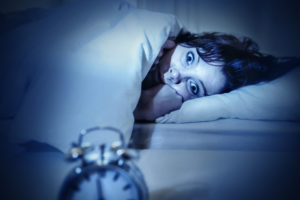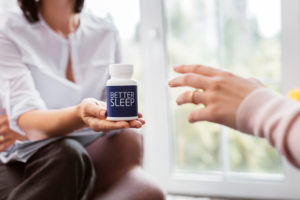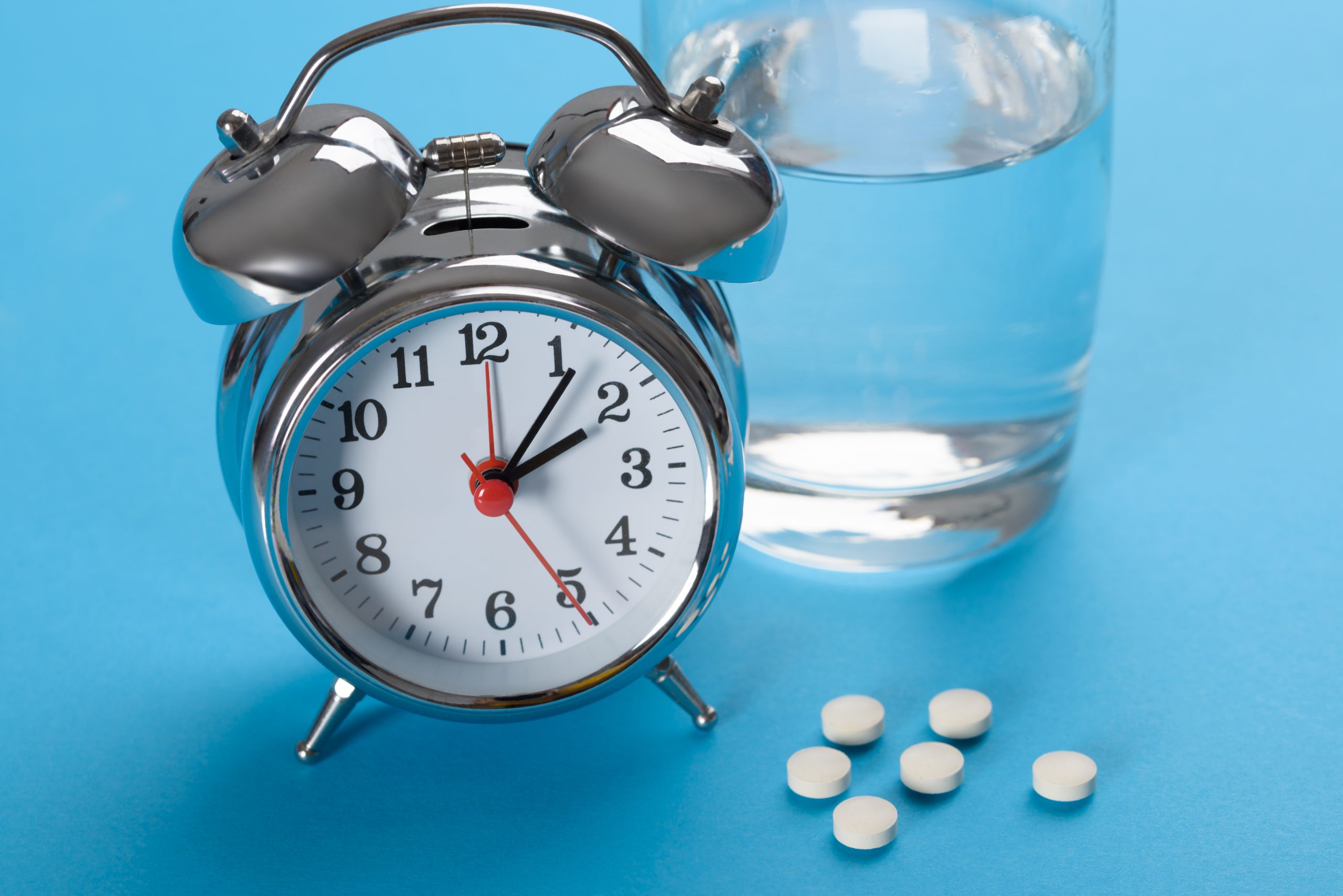It’s no secret that many of us aren’t getting enough sleep and turn to sleep medications for help. Almost forty million Americans get insufficient sleep. They might have trouble falling asleep, staying asleep, or getting restful sleep. Lack of sleep can lead to poor health, including lack of focus, drowsiness during the day, and weight gain, even if you are making healthy food choices.
If you know you are not getting enough rest at night, and find yourself out of energy during the day, you may be tempted to try a sleep medication. Maybe you grab an over-the-counter supplement, or visit your doctor for a prescription. Whatever your choice, research warns of the potential risks of sleep aids.
Lack of Sleep
You’re staring at the ceiling. Perhaps you look at the clock every thirty seconds. Maybe you flip from side to side. You might even count sheep. These are typical behaviors of people who have insomnia.
Most people associate insomnia with not being able to fall asleep. But even if you fall asleep quickly, if you can’t stay asleep, you may also have insomnia. In fact, the inability to stay asleep this is more common symptom.

America Insomnia Survey (AIS) completed a telephone survey involving 6,791 adults. Using the Brief Insomnia Questionnaire (BIQ), about 24 percent of participants had insomnia and indicated that while they could fall asleep, it was hard to stay asleep. Among people with insomnia:
- 61 percent couldn’t stay asleep and woke up frequently during the night.
- 52 percent of people with insomnia woke up too early in the morning.
- 38 percent of individuals with insomnia reported difficulty falling asleep, taking as long as half an hour to drift off.
- 25 percent woke up still feeling tired.
- 50+ percent had two or more symptoms of insomnia.
The study also rated 21 medical conditions that could contribute to insomnia. 50 to 60 percent of people complained of some kind of chronic pain keeping them awake; most frequently citing back or neck pain. Seasonal allergies also were given as primary reasons for insomnia. Overall, people with insomnia rated their health lower than people without the condition.
Sleep Medications

In the past 30 years, people have increasingly turned to medications for assistance sleeping. Most people have heard of brand name pharmaceuticals like Ambien, Lunesta, or Sonata.
The primary visual of advertising for these remedies shows individuals in ambient, restful light, fast asleep, and full of energy the next day. But the ads rush the list of side effects, some of which can be severe.
Although experiencing serious side effects are rare, keep in mind they can happen the first time you take any of the medications. Even if you don’t experience an initial reaction, you can have one with any subsequent dose. Taking the lowest recommended dosage does not reduce risk.
Read all warnings related to these medications and ask questions if you don’t fully understand them. Also, avoid alcohol when taking any sleep aid.
Dietary Supplements
Some people believe taking supplements is a gentler way of helping them sleep. Although that may be true, data is inconclusive that they help in any meaningful way. Knowing the proper dosage that works best for you, and lack of high-quality research are two factors that contribute to ineffectiveness.
In its most recent clinical practice guidelines, the American Academy of Sleep Medicine took a closer look at a few popular supplement-based sleep aids, including Melatonin, L-tryptophan, and Valerian. Ultimately, it recommended against all three.
Many people believe Melatonin helps people fall asleep more quickly without any lingering symptoms. It may reduce the time it takes for you to fall asleep by five or six minutes, but there is insufficient research to confirm it provides anything but a type of placebo effect.
Early studies on L-tryptophan indicated it might be helpful, but some clinical trials reported mixed results. L-tryptophan is a precursor of serotonin and could cause some drug interaction, so check with your doctor before using it.
Valerian has also been studied, but only on a small population. The two largest clinical trials did not show significant efficacy.
Most people don’t have any trouble using other sleep supplements, including cannabidiol (CBD) and kava. They are well-tolerated, but their effectiveness varies from person to person.
You may use chamomile and lavender in a tea. These are considered safe, but don’t improve your sleep patterns. You may believe they are useful because you feel yourself unwinding when using them. But when you’re drinking the tea, you are not working or running around. You’re de-stressing from your day, which relaxes you. When you’re more relaxed, it’s easier to fall asleep.
Black Box Warnings
This past spring, the Food and Drug Administration (FDA) required sleep medications to carry “black-box” warnings. Visually, these warnings have black boxes around them, which indicates that an adverse reaction to the drug may lead to death or serious injury.
Sometimes a black box is added to a label at the time a new drug is approved. But more frequently, it is added after approval of the drug and when the FDA receives reports of side effects. When that happens, the FDA confirms the seriousness of the risk. Then, depending on the severity of an adverse event, a boxed warning is provided, but does so in collaboration with the pharmaceutical company.
A black box does not warn against using the medication. But it does alert you to potential risks so that you can make a fully informed decision about taking it.
When sleep medications were initially developed, no one worried about them. But over the past 26 years, 66 cases have been identified involving severe injury and death in individuals taking these medications. They occurred when people were sleepwalking, sleep-driving, or participating in other activities without being fully awake. Checking with your physician before ingesting any of them is always a good idea.
7 Tips for Taking Sleep Medications
The Sleep Education Center provides seven safety tips if you intend taking any sleep medication.
- Before taking a sleep medication, discuss it with your doctor. Talk about other medicines you already take so you are confident there won’t be any drug interactions.
- Educate yourself. Read the insert that comes with your medication. If you experience any side effects listed, contact your doctor right away.
- Your doctor prescribes the dosage best for you. Do not over or under medicate yourself.
- Never drink alcohol close to the time you’re scheduled to take a sleep aid.
- Most prescription sleeping pills recommend planning for seven to eight hours of sleep. If your schedule doesn’t allow for that much time, don’t take the medication.
- When you start taking a sleeping pill, you may experience a drowsy hangover the next morning. Begin using your medication when you don’t have to be anywhere the following morning.
- Never drive a motor vehicle after taking a sleeping pill.
If you have trouble sleeping – either going to sleep or staying asleep, there are helpful treatments available. Although many people will self-medicate with over-the-counter supplements, your best option is to talk with your healthcare professional or a board-certified sleep specialist about available treatment options. If you have an ongoing problem with insomnia, consider contacting an AASM-accredited sleep disorder center.


Thanks for telling me that it will be best to talk to a doctor about taking sleep medication. I have quite the insomnia issue and I wouldn’t want to take too large a dose since I fear the side effects of doing something like that. I’ll be sure to take your advice by doing my research and reading about any side effects of sleep medicine before taking them.